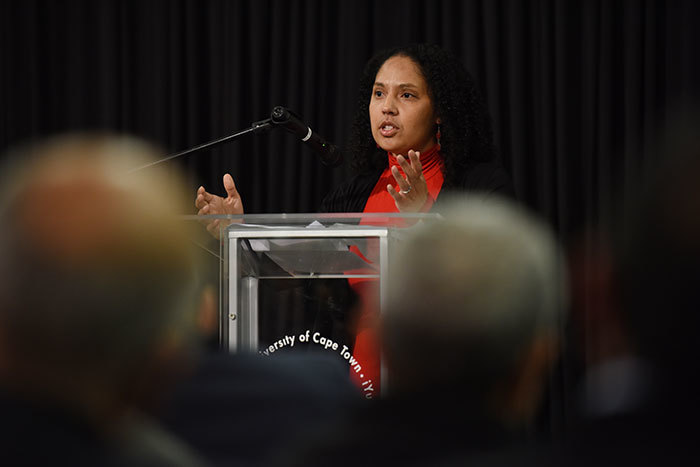'Let Neville's name be an encouragement'
01 September 2015 | Story by Newsroom
It was a "sad but special" occasion, in the words of programme director Dr Russell Ally, as the university gathered to officially inaugurate the Neville Alexander Building on 28 August, three years and one day after the activist-scholar's passing.
Dr Neville Alexander was a prolific writer and teacher who, through his work at UCT and the broader South African political spectrum, fought for an egalitarian society.
"His views were premised on the idea that race has no biological validity, and that radical politics has to begin from an anti-race and anti-racist position," said Vice-Chancellor Dr Max Price. "In his last years, this was the source of his critique of the use of race in, for example, the university's admissions policy. One of the significant and last contributions he made while at UCT before he died was as a member of the commission appointed by Council to review the admissions policy, which produced policy that is currently being implemented for the first cohort to be admitted in 2016."
The southern end of campus
Professor Sakhela Buhlungu felt it "quite proper and fitting" that it was the Faculty of Humanities that was honouring Alexander in this way. The dean of the faculty was at pains to point out that Neville Alexander had not usurped another person's name in having this building named after him. He explained that this "was a building without a name", having been referred to as the "Humanities Graduate School Building" and "Humanities Building" – interim monikers until a suitable name was identified.
This building, at the southern end of the campus, was "less fortunate" than its cousins, said Buhlungu, in that until now, it didn't have a name. Its occupants had also changed so many times. The first was the then-Faculty of Education in the 1960s – and Buhlungu noted the connection to Alexander, who was a famed educationalist. Now, the School of Education ("note the difference", said the dean) was one of its occupants.
"The combination of those departments speaks to the work of Dr Alexander in various ways: education, philosophy, the Schools Development Unit ... and of course the Institute for Humanities in Africa," he said.
Last of the true revolutionaries?
Dr Lydia Cairncross – who'd first encountered Alexander when she joined the Workers Organisation for Socialist Action in 1990 at age 14, and last seen him a week before he passed away, which was days a few days after the Marikana massacre – was the ceremony's keynote speaker.
Building on Alexander's work, Cairncross plotted a course of action for creating an egalitarian South African society. Whether this was volunteering in local clinics, running reading groups, enabling food gardens or transforming schools, Alexander exemplified the idea of acting locally.
"But we also need to look at the global picture and the more fundamental change needed. Perhaps taking Neville's work forward, not as a 'frozen in time' set of truths but rather a series of questions that still need to be answered, can be a beginning," said Cairncross.
Those questions included: what is meant by nation building? What is race and what is its role in the new South Africa? How do we develop a value system for a new society while crushed by the brutality of the current one?
Cairncross quoted Jonathan Jansen as calling Alexander "the last of the true revolutionaries".
"I hope that in this one instance he is wrong and that some of those beautiful ones are not yet born and yet others live among us. I hope that Neville's name on this building will encourage those who learn within it to live as he did, with courage and integrity, to always ask the difficult questions and to be so bold as to try to change the world."
Watch a video of the event:
Story by Yusuf Omar. Photo by Je'nine May.
 This work is licensed under a Creative Commons Attribution-NoDerivatives 4.0 International License.
This work is licensed under a Creative Commons Attribution-NoDerivatives 4.0 International License.
Please view the republishing articles page for more information.










